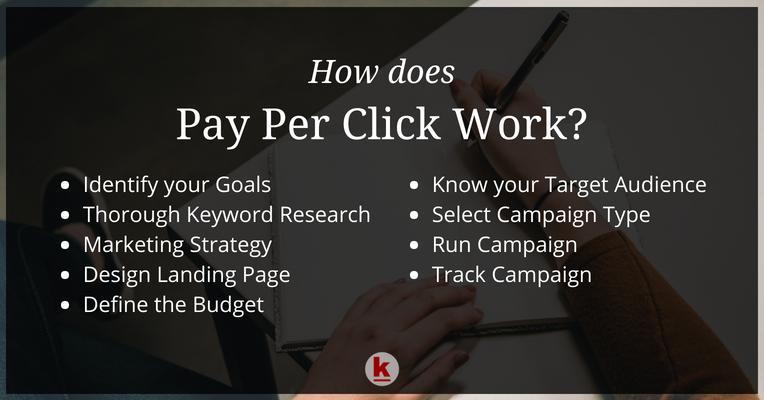Belonging to today’s era, we’re sure you’ve heard of PPC or Pay Per Click advertising. But do you know how pay per click really works? If you’re looking to figure out how it works, you’ve landed on the right article!
So, what is the definition of pay per click? In literal terms, it is a way of paying for visitors to visit your website. As the name suggests, in a PPC campaign, a marketer or business owner only pays when a user clicks on his or her ad. When a user clicks on your ad, your business pays the current cost per click (CPC) from the budget you’ve allotted to your campaign. Once the entire budget is drained out, your PPC network will terminate your ads until you pour in more funds again.
PPC is a way to drive online visitors to your business website. Search engine optimization is one of the popular ways to make your business more discoverable to a relevant audience that is looking for your products or services, ultimately helping your business grow.
Organizations that are familiar with the digital domain understand the importance of ranking well on SERPs. They also understand that it is a lengthy and time-consuming task. So, this is where pay per click advertising comes into action. A pay per click campaign lets your business rank on highly relevant keywords to make you discoverable to a relevant audience. However, initiating a PPC campaign isn’t too easy! So it’s not a good idea to dive into it without planning, strategizing and allocating budgets.
Adhere to the following pointers while starting PPC strategy for your business:

Know your Goals
Before you start, identify what you want to achieve through this PPC campaign and why you’re initiating one in the first place. Do you want quick results? Do you have surplus funds and would like to use them effectively? Are you targeting a specific opportunity that is time sensitive? Do you just want to increase the number of visitors to your website? Get a good understanding of why you want to do this.
Once you know what you want to achieve, you will find it easier to plan out your PPC campaign. This includes creating your ads, tweaking them for better performance, tracking your ads, and revising your campaign. Identifying your end goal is essential for an effective PPC advertising journey.
Keyword Research
When it comes to PPC, everything stems from keywords. The keywords you select can make or break your PPC game! Therefore, it is important that you carry out a thorough keyword research before creating ads with them.
The trick here is to think like your ideal customer. What are the keywords that your target audience is possibly searching for? You must take this into account when selecting your keywords. Once you have your final keywords, it’s time to group them into categories.
Needless to say, you will only get to test the efficiency of your keywords once you start running your ads. You will probably have to tweak your ads and the keywords used in them after analyzing the performance of your ads.
Ad Strategy and Creation
Once you have selected your keywords, it’s time to create your ad strategy. Creating effective PPC ads is a skill that not everybody has. You have to make sure you create ads that seem tempting to click on, relevant and not misleading.
Think about terms and phrases your ideal customer would typically search for while looking for products or services offered by your business.
An important point to keep in mind while creating your ads is to make sure your ads take your user to a landing page that is relevant and not misleading. A lot of times, people click on ads and are taken to irrelevant landing pages. This can bruise your brand in the long run.
Design a Landing Page
Think of where your users would arrive once they click on your ad.
To a landing page! Eventually, it all comes down to the landing page where you are hoping your visitor to make a conversion or inquiry. The question is how can you design an effective landing page?
The landing page should be relevant to the ad your user clicked on. The transition from clicking on the ad to arriving at the landing page and consuming the content should be smooth. At no point in time should a user feel like he or she is lost or does not know what is happening.
A good landing page has content which is easy to consume, clear calls-to-action, and preferably a contact form for the visitor to get in touch with you. Other than that, your landing page should be clean, attractive and organized.
Define a Budget
It is important to have a defined budget for running PPC ads. Not only is this beneficial for the business or company, but it also give you a good idea as to the kind of results you can achieve within a set budget.
Consider involving your finance team to know what kind of budget can be set for PPC campaign, such that other business tasks are not hampered by it. Small businesses that face many challenges to have successful online presence can consider pay per click marketing for their business.
Target Audience
It is important for you to identify exactly who you want to target through your PPC campaign. The way to do this is to identify the kind of search phrases or terms they would typically use to search for products or services offered by your business.
Through your ads, aim at solving problems that your audience is possibly facing. Wouldn’t you feel great if you saw an ad that provided you with a solution to a problem you have been facing?
You can also target a specific audience through geographical and time filters. If your audience is only present in a certain area, you can choose to have your ads displayed only in that area. If you think your audience is likely to search for something during the night time, you can select the time period for which you want your ads to be displayed!
Campaign Type
Select your campaign type. Do you want to display only textual ads? Do you want to list a product? Do you wish to display a visual ad along with a picture? Based on your research and budgets, select the type of campaign you would like to run for your business.
You can also choose the social media platforms on which you want to run your ads.
Run your Ads
Now that you have all of the above in place, it’s time to finally run your ads!
Set up all your ads on your chosen network such as Google AdWords or Bing. You can set up single or multiple campaigns. Pick your settings and filters based on your ad strategy such as geographical filters, timings, negative keywords, budget per ad etc. Once all your settings are in place, you can activate your ads. You can pause and tweak your campaigns at any time you like. This brings us to the next point!
Track Ads
Perhaps the most important step in creating and running your ads is to track and analyze their performance. Only once you track the performance of your ads will you know what’s working. Or what’s not!
Once you identify what’s causing your ads to perform low, you can make relevant changes to them. Testing the performance of ads is probably the most enjoyable part of the entire process! This is where you get the hang of it! Once you are able to tweak ads to make them perform better and witness that success, you will begin to run ads that bring you quality leads, more traffic, and ultimately more conversions.
Running PPC campaigns is a consuming process. If you have the time that it needs to run an effective campaign, we encourage it! If you don’t have enough time, we suggest you hire somebody who understands how pay per click advertising works and PPC strategies and tactics that work well.
We’d love to know your thoughts on PPC Advertising! Would you implement it for your own business? If we missed out on something, let us know in the comments below!




Leave your comments
Post comment as a guest